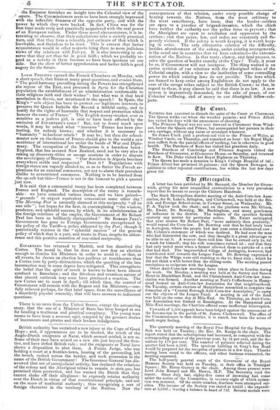Lours PHILIPPE opened the French Chambers on Monday, with a
short speech, that hints at many great questions, and evades them. " The good harmony prevailing among the Powers has strengthened the repose of the East, and procured in Syria for the Christian population the establishment of an administration conformable to their religious faith and their wishes" : but what was it that bred revolution in Serria, not mentioned in the speech ? In Spain, the :King's " sole object has been to protect our legitimate interests, to preserve for Queen Isabella the Second a faithful amity, and to testify for the rights of humanity that respect and protection which honour the name of France." The English money-market, ever as sensitive as a jealous girl, is said to have been affected by the omission of ESPARTERO'S name! But, not to found much upon -words, it may be asked what " interests " France has been pro- tecting, for nobody knows ; and whether it is necessary to "humanity " to harbour rebels ? It may be; but then the school- master now on the throne of France should give to the world a new accidence of international law under the heads of War and Diplo- macy. The occupation of the Marquesas is a harmless boast : England, that has secured New Zealand, need not be very nice in raking up discovery-titles or savage cessions in order to dispute the sovereignty of Marquesas. " Our dominion in Algeria becomes everywhere stable and respected." Does it ? Negotiations with foreign states are vaguely alluded to, so as to flatter the French as- pirations for an external commerce, yet not to alarm their prevalent dislike to unrestricted commerce. Nothing is to be learned from the speech but this—France is not in the humour to pick a quarrel just now.
It is said that a commercial treaty has been completed between France and England. The description of the treaty is remark- able : we have conceded various duties, and we have gained- " grounds " to expect equivalent concessions some other day ! The Morning Post is naturally alarmed at this reciprocity " all on one side "; but hopes for the best, in contemplating "the wisdom, prudence, and splendid success, by which, in its administration of the foreign relations of the empire, the Government of Sir Robert Peel has been so brilliantly distinguished." Sir ROBERT PEEL'S Government has gone to Foreign Governments strengthened by the policy of the Tariff—a policy abhorred by the Post; though it patriotically rejoices in the " splendid success " of the general policy of which that is a part, and trusts in PEEL despite its abhor- rence and this positive assertion of one-sided reciprocity.


























 Previous page
Previous page